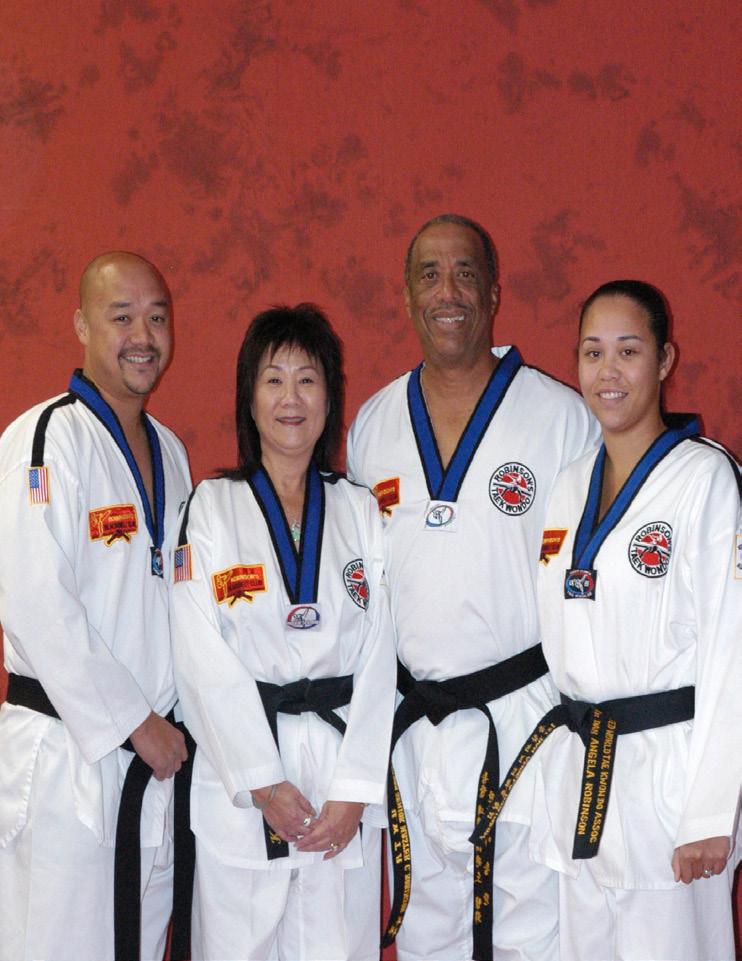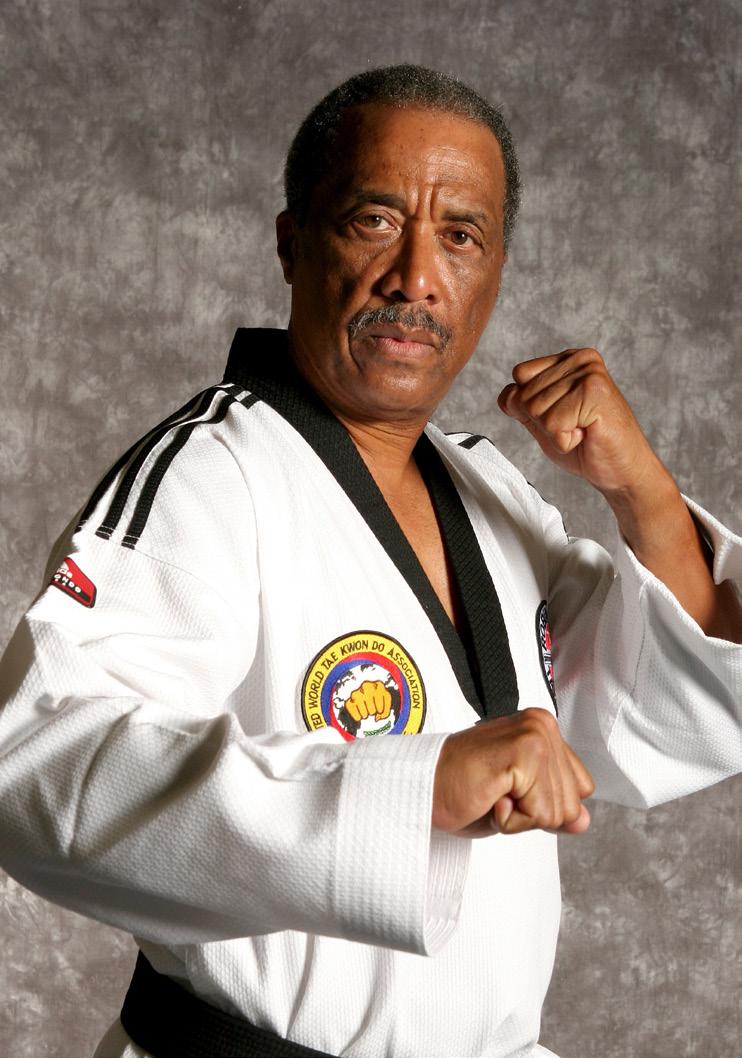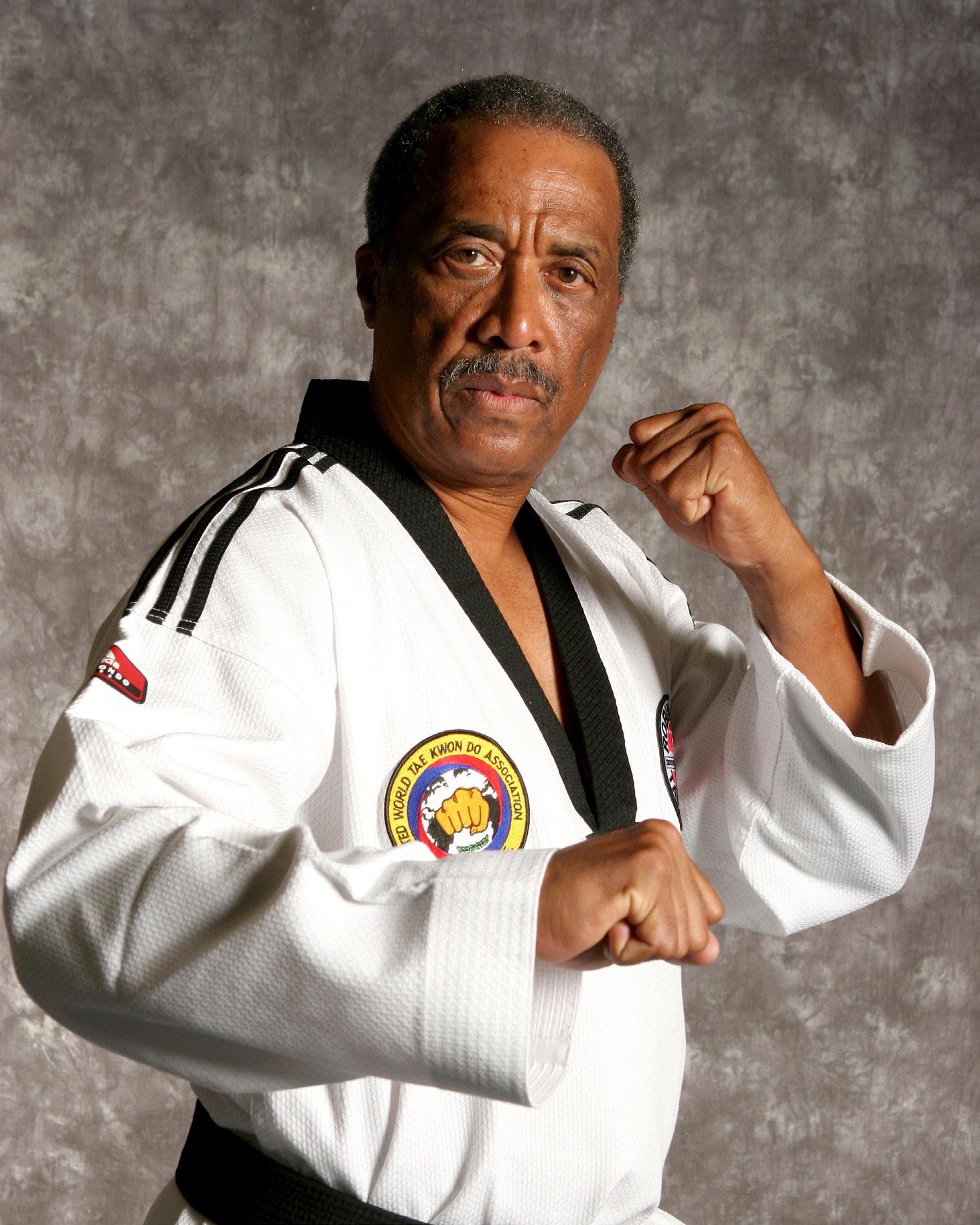
12 minute read
GM CLINTON ROBINSON SMASTER Guy E. Larke
The Amazing Odyssey of GM CLINTON ROBINSON
PART 1 By Sr Master Guy Edward Larke
Advertisement

When we think in terms of martial arts history, we often look to the Shaolin Temple in China, the Sengoku Era of Japan or even the Shilla Dynasty of Korea. What we tend to overlook is the renaissance of Asiatic fighting arts in North America.
Historians talk of the 1960’s being the British Invasion as far as music, but there was another phenomenon taking place. The introduction of the martial arts was sweeping across the continent. In movies, you saw Sean Connery Judo throwing baddies like no one’s business. British spies on BBC seemed to all be proficient in kicking, chopping and throwing. Most noticeable was the larger-than-life chauffeur and partner of the Green Hornet, Kato (played by the immortal Bruce Lee)!
At the same time unknown heroesto-be began popping up from places unknown. Joe Lewis, Bill Wallace, Mike Stone, and… my lifelong idol, Chuck Norris headlined a long list of aspiring warriors. Karate schools and competitions began to explode across the US.
Being born at the end of this so-called golden age I watched in amazement with my parents and brother. After many years I came to realize what a truly amazing time it was and how HARD it was for those rare gladiators to get any form of success. It wasn’t
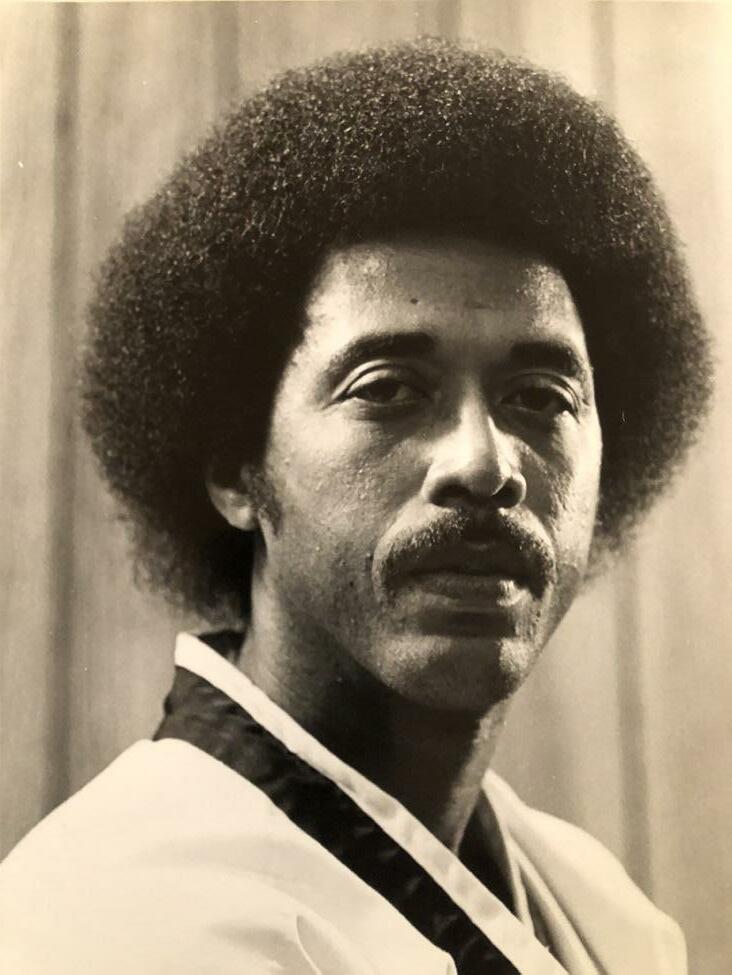
until decades later at a Kukkiwon Foreign Instructor Course that I met one of those martial pioneers. Better yet was how truly approachable he was and willing to share advice and motivation with a much younger Canadian who felt more than a bit out of place. With that said, it is my honor to introduce a truly unique individual by the name of GM Clinton Robinson.
Larke Thank you for your time, sir! It has been a long time since we met face-toface!
Robinson Yes, it has! Time really flies.
Larke For those unfamiliar with your story, could you give us a little background about yourself?
Robinson Okay, well, I'd say that's probably a good, perhaps a good starting point. I was born in 1948 in a place called Mobile, Alabama. That’s in the “Deep South”. This was during troubling times. It was quite troubling in the South in the 50’s and 60’s. Matter of fact, I happened to live in Alabama at the time that a gentleman by the name Larke Yes. Interesting period.
Robinson So, it was interesting times. I actually grew up there as well. I attended a local college. Not actually not a local, but an Alabama college that at the time was called Tuskegee Institute. It's now called Tuskegee University, which was founded by this guy, Booker T. Washington. So, I was pretty much motivated to go there. Also, one of the principals at my junior high school had attended Tusky (Tuskegee University) and I had really, admired the guy. I thought he did really good things and I wanted to kind of follow in his footsteps to a certain extent. Then things got interrupted, because my dad, who was a civilian employee for the military, they shut down the base in the city that we lived in. So, my dad elected to move to California. My gosh, you know, having all of my friends and having grown up in Alabama all those years, I was somewhat reluctant to do that, but I didn't have any relatives I could stay with. So, the entire family went to California.
Larke That must have been a culture shock!
Robinson Yes, and at the same time, perhaps it was supposed to happen. Because in Alabama, it was somewhat difficult for a black man to get a job. I mean, I was kind of like standing out on the streets like we see now here in California. see minorities hanging around, waiting on trucks to pick them up, and give them a job for a day. Well, I did not have any idea where I was going and what I wanted to do. So, I applied for jobs in California and ended up getting a job working at a Denny's restaurant, as a dishwasher of all things. That's where I got introduced to Taekwondo. So, this was in 1966.
Larke Wow, we're going into the golden age of martial arts in America.
Robinson So, you know, the guy that owned the restaurant, had sponsored an instructor from Korea. I never, being from the deep south of Alabama, had ever seen any martial arts, particularly in black communities. That in fact, got an even I've never seen or heard of any of these things. And so, this gentleman, a guy by the name of Jim Prather. He passed recently. He and I remained friends all these years. He encouraged me to participate. I'm going, Man I don't even know what this is. I'm trying to get through college. You asked me to go down this place. So, I said, I'll take a look. I went down, and took a look. It was the craziest thing I've ever seen in my life. I mean, people were walking around in pajamas, barefoot, and yelling. Well, this looks like a bunch of crazy folks to me, man. I don't think I want to do this. So, I didn't go back. Fortunately, he was persistent. He said, I think you'd be really good.
Larke What was your first impression of him as a person.
Robinson You know, he was a nice guy. I mean, he was very patient. He didn't force me, just gently twisted my arm. Yeah,

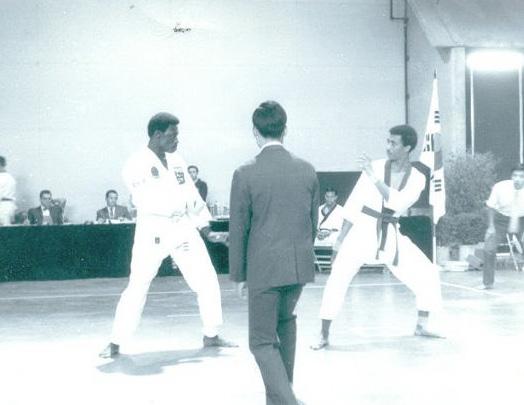
so I went down. I was glad he was insistent. Because once I took a class, I was hooked. So, I thought that it was the coolest thing. Ever! You know, the way some of those guys could move!
Larke What was the name of the school? Do you remember?
Robinson I know. It was. My first instructor was a gentleman named Myung Kyu Kang. He was a Moo Duk Kwan guy. Now, Taekwondo was not popular at that time. Matter of fact, it was not even taekwondo per se. More like Tang Soo Do. Things were in transition in the 1960’s around 1965 to 1966, when they were promoting the name, Taekwondo, and things of that nature. So, I walked into the school one day, and suddenly, we were doing Taekwondo. I was like, Okay, so it didn't make any difference to me. Because, number one, Kang was the only school in town, so like where else you gotta go. This is what you're teaching, and this is what I'm going to learn. So that began a very interesting experience. Fact is, as a younger man, my dad never allowed me to participate in athletics I was recruited for various sports, but I could never take part.
Larke So, how old were you when you formally started training?
Robinson Larke What was it that like? What was harder? The training, the sparring, the forms…
Robinson I'm glad you asked that. I’ll tell you a story about that. Because, you know, there were a number of other guys in there that were in my age bracket. We would sit there and… weight classes meant nothing… we did all the exercises. It was a very small dojo, and Master Khan would send me and three or four other guys outside. We had to go out on the sidewalk with a yellow belt as our instructor. So, at the end of class, we would go in, we bow out with everybody. Then we got to the privilege of cleaning the dojang. It was a hardwood floor. So, we met up and we had his army blankets, and kind of rubbed the floor. I can't believe we did that every night. Sometimes we watched some of the other guys from time to time. I remember this vividly, when they did sparring, my buddies and I would sit there and we'd nudge each other and say, You know, I think I can beat that guy. This guy is no good. That guy is no good. But Master Khan wouldn’t let you spar until you made Green Belt. So, with that in mind, he says, Okay, we're gonna stay here to at least green belt so we can display our skills. So sure enough, eventually we made green belt, and it came time to spar. We all got destroyed! We came back and sat down. The comment were like this, Man, that guy got good. No kidding. Me? Probably. We weren't that good. But it was like now he got better. So, he just beat the crap out of me. Yeah, I'm convinced now. But I made a lot of really good friends there and actually entered a competition probably two weeks after I began training. Yeah, with not understanding the rules. Not So, really knowing anything other than how to do some stepping and stand in front of a brick wall and throw middle punches and rising kicks. But I went to this competition. They had all these white belts. There were tons of white belts. I mean, that was about 50 of us in the same category. So, we all lined up. The guy next to me, and I don't think things have changed these days, tried to intimidate me. He goes, How long have you been training? Uh, a couple of weeks. So, I respond to him, Heck, how long you been training? He says, I've been training a couple of years. So, I think he wanted to scare me. My thought was I'm gonna kill this guy. Two years, and he's still a white belt?
Larke Looking back, do you find that growing up where you did it kind of toughen you mentally. So, the idea of pushing you around was like… good luck!
Robinson Thank you. You’re right, because I did. You know, something that amazed me in the class was the students would ask the instructor questions that would puzzle me. One of those questions was, How would I use this in a real fight? I've never had to ask that question. Because everything I saw them do. I'm going, Okay, I could apply that here. I could apply this and that situation.

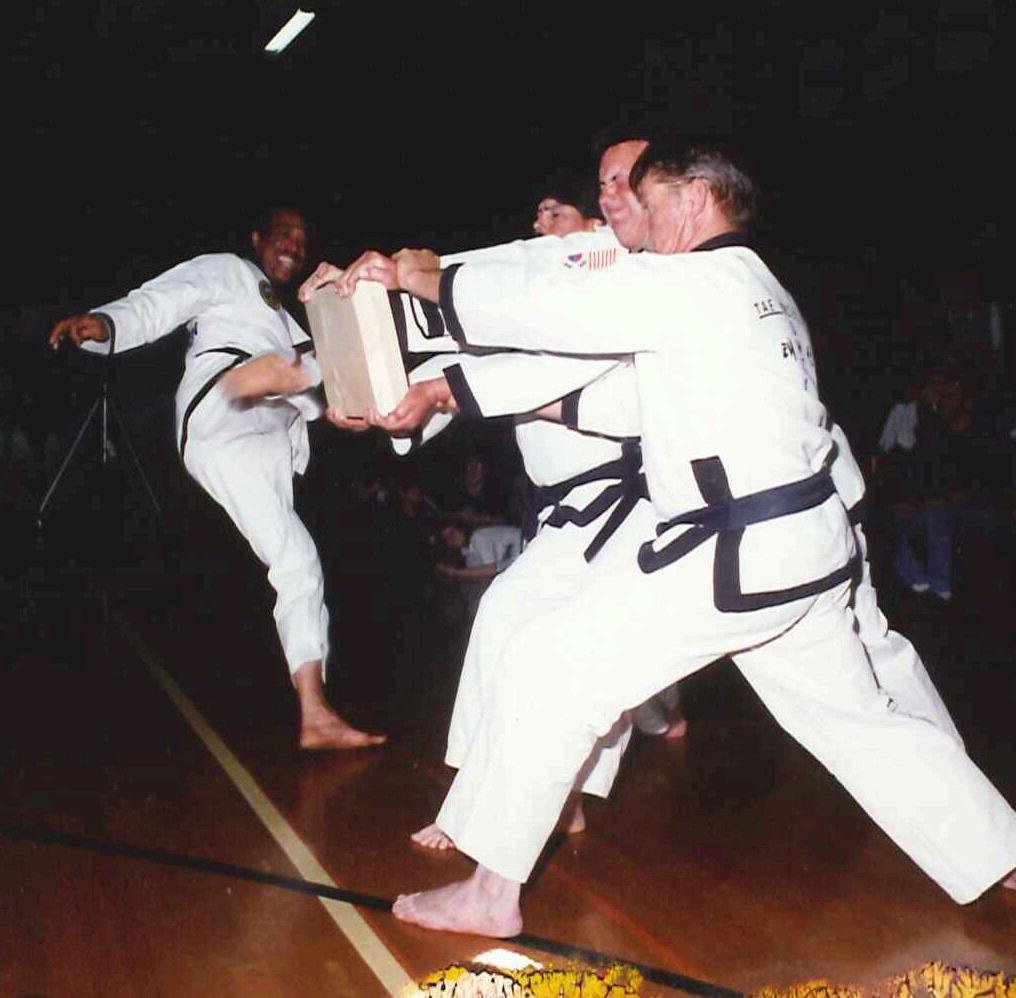
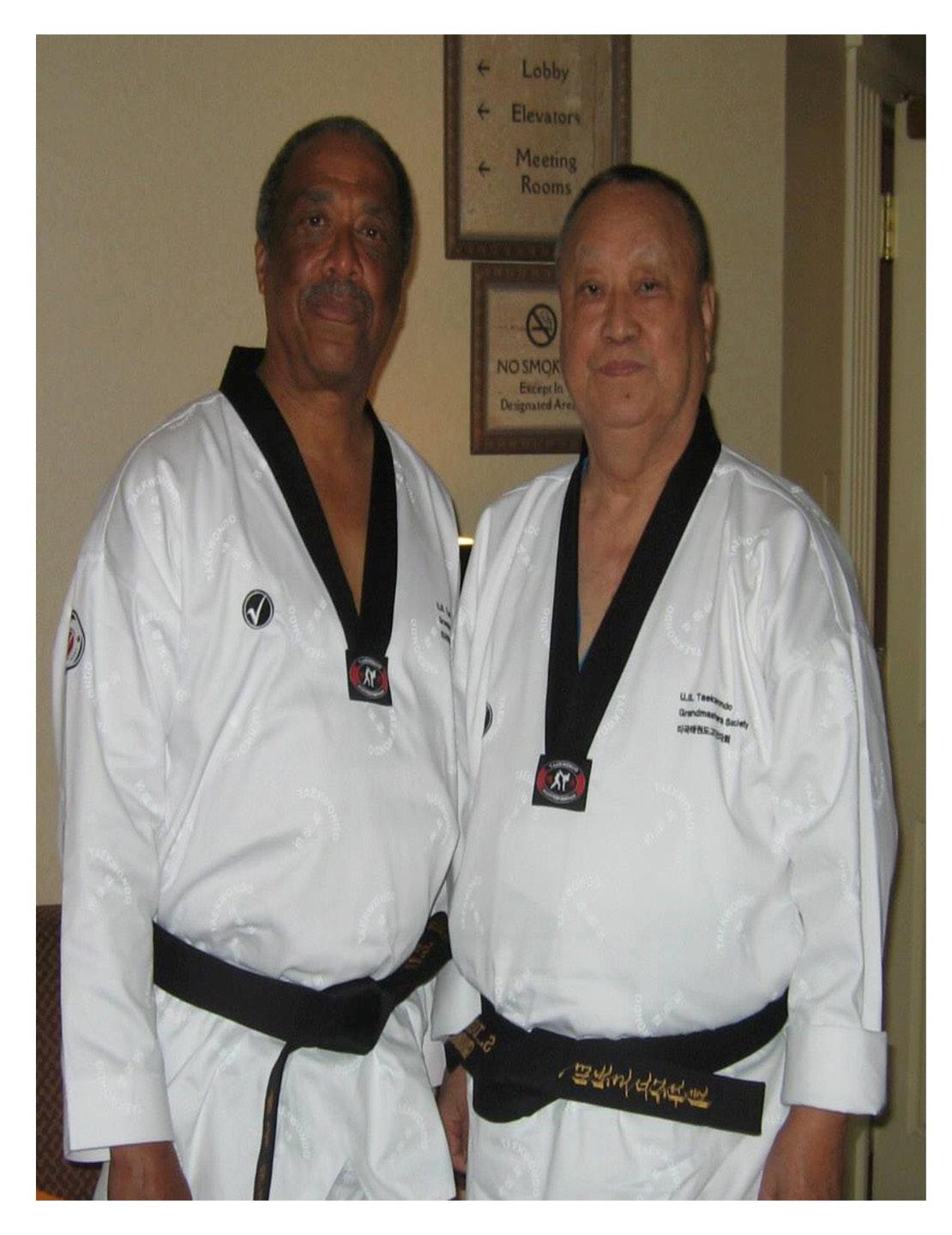
I immediately knew what situations because I'd been in tons of fights. For me, that was normal growing up. So that was amazing. My guy said people older though, never had a fight. That to me was amazing. So, but I stayed with it. I made some good friends there.
Larke What was your first black belt test like? Robinson Oh, my first Black Belt test? See, I had an interruption there because I got up to Red Belt, at which point I ended up getting drafted in the military. Rather than go in the army, because I'd been involved in Army ROTC and knew that I would be sent to the frontlines of Vietnam. So, I decided to join the Air Force. So first, my intention of joining the Air Force was that I would go to basic training and come back home so I could resume my training with Master Kang. It did not work that way. I had to go to a technical training school and those kinds of things. So, I continued to train by myself, and in 1969, took a leave and went back to Sacramento and tested for my black belt with Master Kang. The black belt testing then was pretty strict, you know, very hard core. I mean, I recall, fighting multiple opponents. Half the guys were trying to kill you! We had to do brick breaking and Master Kang was using those old red bricks that you know, if you weren't careful, for that matter, even if you knew what you do, you could conceivably hurt yourself. I had an opportunity while training then to meet the first president of the Moo Duk Kwan right after the split from Taekwondo. and Master Kang to meet. It was a guy by the name of Kang Ik Lee. He came to one of the testings. So that was pretty interesting. Mr. Khan also brought several other instructors into in his school, and perhaps some of these guys may you may or may not have heard of, but me being with a guy by the name of Byung Yu. There was a huge tournament in Sacramento in 1968. It was the USA versus Korea. Many influential people were at that event that actually had made a mark on Taekwondo in general. The U.S. fighters were Joe Lewis, a guy named Ron Marchini. Robert Halliburton. There were a couple other guys. I don't recall their names, but the Korean fighters were Byung Yu guy, a fighter by the name of Dan. Dan Choi was the instructor of Ernie Reyes. Then was Jung Hwan Lee, who's the current Moo Duk Kwan president. And then there was a Yung Ahn and a guy named Jun Hu Kim. Ahn I think is back in Korea, but Kim is in Virginia, North Carolina somewhere. So those were interesting times. All the competitions featured all styles together. There were no individual Taekwondo tournaments.

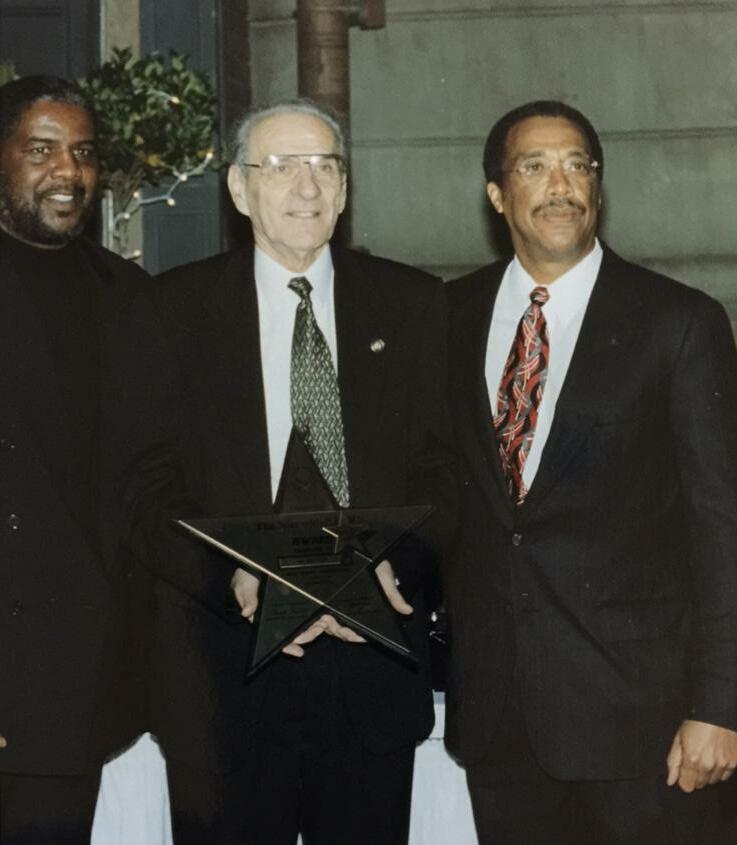
----------------------------------------Discover how a young man with a colored belt changes his life by being drafted and sent to Taiwan. Student becomes a master next issue!
Sr. Master Guy Edward Larke has dedicated his life from a young age to the pursuit of the martial arts, Asian culture and hoplology. It led him to Korea in 2000 and has lived there since then. He lives in Seongnam city with his wife Gi-Ryung and son Alexander. He holds black belts in Teuk Gong Moo Sool, Taekwondo, Hapkido, Taekgyeon, Bon Kuk Kumdo, Korean kickboxing, Karatedo, Wushu, Cheonji-muye-do, and various other arts. Currently he teaches Taekwondo, Karate and Cheonji-muye-do full time in addition to writing for various magazines and running Kisa-Do Muye & Marketing. He can be contacted at kisadomuye@gmail. com .
